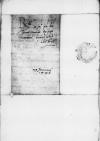Letter #2245
Bona Sforza to Ioannes DANTISCUSCracow, 1539-12-04
| received 1540-01-29 Manuscript sources:
Prints:
| ||||||
Text & apparatus & commentaryPlain textText & commentaryText & apparatus
Reverendo in Christo Patri, domino
Reverende in Christo Pater, sincere nobis dilecte.
Rogavit nos venerabilis pater
Bene valeat.
Dat(ae) or Dat(um)⌈Dat(ae)Dat(ae) or Dat(um)⌉
Ad mandatum s(acrae) or s(erenissimae)⌈s(acrae)s(acrae) or s(erenissimae)⌉ maiestatis reginalis proprium.


 BCz, 3465, p. 288
BCz, 3465, p. 288